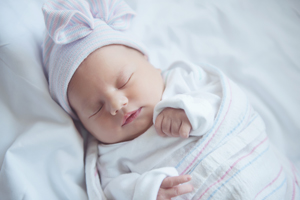Hearing Loss in Babies
Hearing Loss in Babies
Before your newborn leaves the hospital or birthing center, your baby needs to have a hearing test. This is a painless and short test that will be explained to you before it is done. You should be given the results of this test before you take your baby home.
Although most babies can hear normally, 1 to 3 out of every 1000 babies are born with some degree of hearing loss. However, without screening or testing, hearing loss may not be noticed until the baby is more than one year old. If hearing loss is not found until later years, there will not be stimulation of the brain's hearing centers. This can affect the maturation and development of hearing. It can also delay speech and language. Social and emotional development and success in school may also be affected. Many of the complications of hearing loss can be prevented with diagnosis and treatment before 6 months of age.
Most hearing loss is present at birth (congenital), but some babies develop hearing loss after they are born. Hearing loss is more likely in premature babies and babies with respiratory problems who have needed long-term use of breathing machines. It also happens in those with previous infections, and those taking certain medicines.
Because of these risks, many health organizations, including the National Institutes of Health, the Joint Committee on Infant Hearing, the American Academy of Pediatrics, and the American Academy of Audiology, now recommend universal infant hearing screening. This means all newborn babies should be screened for hearing loss. Most often, the parents are the first to find hearing loss in their child.
Updated:
February 21, 2018
Sources:
Screening the Newborn for Hearing Loss. UpToDate
Reviewed By:
Fraser, Marianne, MSN, RN,Image Reviewed by Staywell medical art team.,Kacker, Ashutosh, MD
